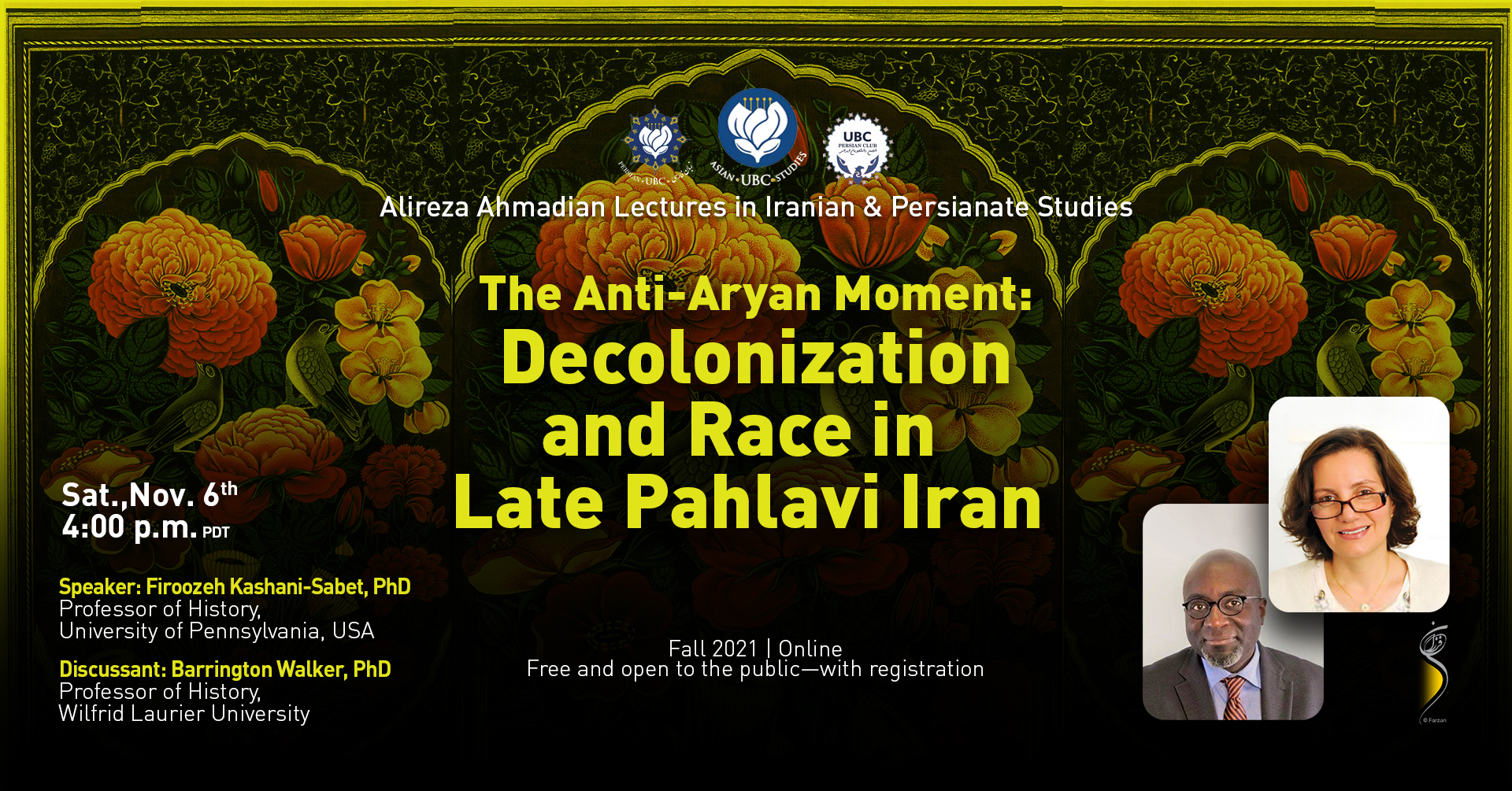

Poster design by Farzan Kermani
مقطعِ ضدآریایی: استعمارزدایی و نژاد در ایرانِ اواخر عصر پهلوی
سخنران: دکتر فیروزه کاشانی ثابت، استاد تاریخ، دانشگاه پنسیلوانیا
طرفبحث: دکتر بَرینگتِن واکِر، استاد تاریخ، دانشگاه ویلفرید لوریه
روشنفکران دوران پسامصدق، آغازگر گفتمانی ضداستعماری بودند که طی انقلاب اسلامی ۱۳۵۷ بهشدت رایج بود. این نویسندگان، که برخی گرایشهای سوسیالیستی داشتند، رویدادهای شمال آفریقا و دیگر کشورهای استعماری سابق را با علاقه دنبال میکردند. ابراز پذیرش یا مخالفت قومی و نژادی با درگیر شدن ایرانیان با بحرانهای جهانی که سیاستهای نژادی را بهشدت به حیاط خلوت آنها کشانده بود، تشدید شد. در حالی که قومیت بهعنوان موضوعی مردمشناختی و سیاسی همچنان موردتوجه بود، با توجه به وابستگیها و گرایشهای سیاسی نویسندگان از طیفهای مختلف، نژاد و نژادپرستی اهمیت بیشتری پیدا کرد.
The event recording is now available:
Intellectuals of the post-Mosaddeq era gave voice to an anti-colonialist rhetoric that burst wide open during the Islamic Revolution of 1979. These writers, some with socialist, leanings, watched happenings in North Africa and other formerly colonized states with interest. Expressions of ethnic and racial acceptance or opposition grew strident as Iranians engaged with global crises that brought the politics of race heatedly to their backyard. While the theme of ethnicity endured as a subject of anthropological and political interest, race and racism rose to the fore as writers of different stripes considered their political affiliations and proclivities. Persian high, and popular, culture grappled with notions of race and skin color in contemporary society, and other ideologies such as Third Worldism, Islamism, and socialism informed these intellectual and public debates. In those years, Iran expanded its network of international relations, and, by 1976, it had pursued diplomatic engagements with more than two dozen African nations. The Pahlavi regime, while flaunting Iran’s Aryan past, was pulled into another orbit. Race relations provided an unanticipated and often missed opportunity for collaboration.
Guest Speaker:
Firoozeh Kashani-Sabet is Walter H. Annenberg Professor of History at the University of Pennsylvania. She is the author of Frontier Fictions: Shaping the Iranian Nation (1999) and Conceiving Citizens: Women and the Politics of Motherhood in Iran. (2011). She is completing a book manuscript, entitled “Heroes to Hostages: America and Iran in a Troubled Middle East.” She is also finishing another book project, “Tales of Trespassing: Iran, Iraq, and the Persian Gulf.”
Discussant:
Barrington Walker, Ph.D. holds a doctoral degree in Canadian History from the University of Toronto (Canada) and is the inaugural Associate Vice President Equity, Diversity and Inclusion and Professor of History at Wilfrid Laurier University in Waterloo Ontario Canada. His research and teaching interests are in histories of Black Canada, race, immigration, and the law. Before coming to Wilfrid Laurier Walker was a professor of history for 18 years; during those years he taught both at the undergraduate and graduate levels and supervised and mentored over 40 graduate students in topics related to his research specialties. He is also often consulted for national television, print and radio media. He has published three books. Race On Trial: Black Defendants in Ontario’s Criminal Courts, 1858-1958 (University of Toronto Press and the Osgoode Society for Canadian Legal History, 2010); The African Canadian Legal Odyssey: Historical Essays (University of Toronto Press and the Osgoode Society for Canadian Legal History, 2012) and The History of Immigration and Racism in Canada: Essential Readings (Canadian Scholars Press, 2008). He also currently finishing two book projects: Colonizing Nation: A History of Colonization, Settlement and Canada’s Racial State Dark Peril: Blacks and Violence in Canada’s Urban Landscapes (Wilfrid Laurier University Press). In 2012 Race on Trial was shortlisted for the Ontario Speaker’s Book Prize.
Should you have any questions, please contact the Department of Asian Studies at Asian.Studies@ubc.ca.